Startups looking for tech tools to manage their tasks and projects have a wide array of choices open to them, thanks to cloud and SaaS subscriptions. But this same advantage tends to overwhelm the uninitiated, with vendors pitching a slew of features that can be confusing at best.
To help you shortlist your best options, we lay down the best project management software for startups. Cost is a primary, but not the sole, consideration. In fact, if there is one feature startups should take a hard look at, it should be scalability. Isn’t it your goal to grow rapidly sooner than later? So, too, must your project management software.

What are the best project management software for startups in 2026?
Project leaders need to catch up with their sales & marketing counterparts when it comes to tech adoption. While 74% of organizations have a CRM in place, only 22% of them have project management software, according to the State of Project Management report by Wellington.
Never has there been a more urgent time than today when project leaders require solid technological IQ to face disruptions such as the impact of AI and the rise of remote work on projects. The pandemic and geopolitical disruptions point to the value of having the flexibility to manage projects and people remotely, a capability strongly abetted by top project management software.
The tools on our list of best project management software for startups below will help ensure your project’s success. Successful managers point to how project management software has helped them, among others, monitor progress via Kanban, manage tasks using taskboards, track bugs more easily and adapt to agile. So, too, you can, and it starts with selecting the right software below.
Source: Digital.ai
Top Project Management Software for Startups
1. monday.com

monday.com adapts to a range of uses cases and business sizes, including startups. Its feature set can be configured to fit the workflows of sales & marketing, creatives, software development, operations, HR and most other fields dealing with projects, as these prominent monday.com users do. With a free plan that you can use forever, the software makes it an ideal tech asset for bootstrapping companies.
Its core features promote visibility, accountability, productivity and efficiency to your tasks, work routine and projects. As a work OS, it acts as your team’s centralized workspace, where members can share, communicate and collaborate on tasks. Leaders can use the software’s visual dashboards to track project progress, monitor task statuses, plot project plans or measure campaign metrics.
And because all relevant tools, tasks, team members and workflows are in one place, you avoid silos, bottlenecks or duplicate tasks, as everyone is kept in the loop and has quick access to files, tasks and other project details. You can, however, use permission rules for sensitive data.
monday.com also integrates with business apps that you may already be using, further consolidating your communication and activities. The apps include Slack, Google Apps, Dropbox, Zoom, Microsoft Teams, Outlook and a variety of other programs for collaboration, communication, accounting and task management.
Paid plans start from $8 per user/month.
Detailed monday.com Review
2. Wrike

Wrike offers a free task management app that startups can use to manage their initial tasks. As they grow, they can scale the software for more advanced features. Wrike suits several use cases such as product development, professional services, creatives, sales & marketing and any work scenario requiring a collaborative space.
You get useful task management tools for alerts and workflow automation, including automating an approval process. You can also organize tasks into pipelines that fit the project’s workflow, helping you push tasks to the right people at the right moment. Customizing dashboards and request forms further add to your flexibility when handling projects with different dynamics.
Likewise, Wrike features visual proofing, a key tool for creative teams. If risk assessment is critical to your project, an AI-powered Work Intelligence helps you predict outcomes and create smart workflows to mitigate risks.
Wrike also features built-in project templates, digital asset management, time-tracking, project portfolio management, Gannt, Kanban, and other visual tools and team calendars.
You can integrate the software with key business apps such as Outlook, Salesforce, Tableau, Google Apps and MS Project.
Paid subscriptions start at $9.80 per user/month.
Detailed Wrike Review
3. ConnectWise Manage
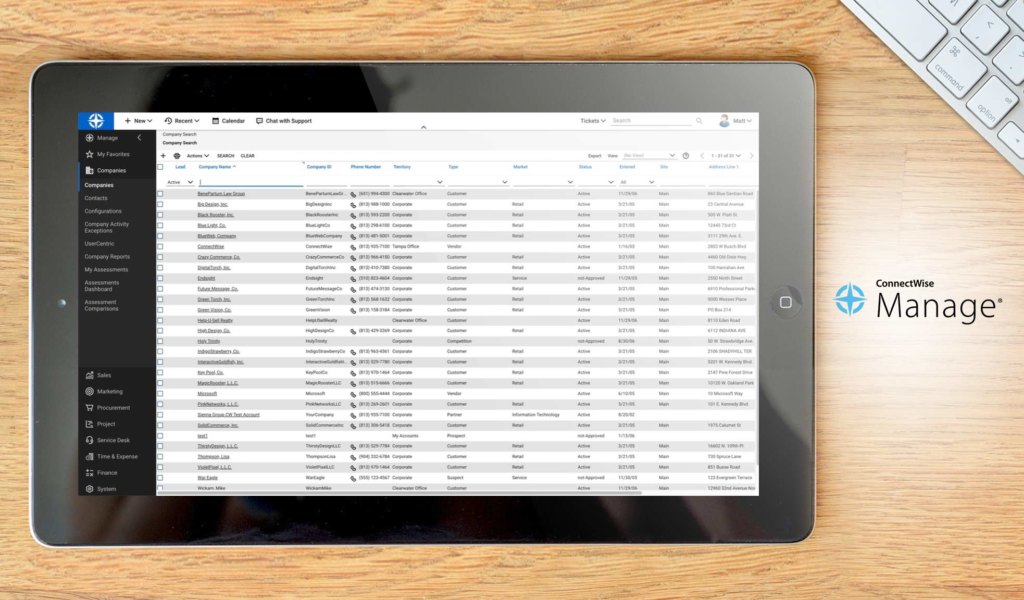
ConnectWise Manage is designed for professional service automation. Those into managed service or are planning to start one will find the software aligned with their needs. Among others, ConnectWise Manage helps them streamline billing and procurement, generate KPI insights, boost customer service and, generally, keep different teams in the loop.
You get visibility across operations, whether it’s looking at the big picture or drilling down into task-level data. You can also customize workflows for projects that won’t fit into a template. That said, pre-built project templates are available to help you set up a pipeline out of the box.
With centralized data, teams get a single context of tasks, lending to the organization greater accountability and transparency.
ConnectWise Manage also features marketing tools to measure email campaign performance and monitor campaign metrics. Other key features include auto-billing, salesforce automation, cybersecurity management, procurement management, time tracking, EDR and reporting & analytics.
Pricing is by quotation request.
Detailed Connectwise PSA Review
4. Smartsheet

Smartsheet features a no-code work collaboration space that can scale from small to complex projects, making it ideal for fast-growing startups.
For project management, the software enables you to streamline processes, automate workflows and organize admin tasks. You can also utilize it for content management and governance and compliance.
Smartsheet also adapts to more complex tasks, such as managing requests, automating cross-system workflows, implementing enterprise governance and optimizing the allocation of skills and resources. Bank-grade security ensures that all project data and details are kept safe.
The software can grow with your tech stack; it is able to integrate with AWS, Adobe, JIRA, Salesforce, Microsoft and other key business systems.
Pricing starts at $7 per user/month, with three plans for the picking: Pro, Business and Enterprise.
Detailed Smartsheet Review
5. Zoho Projects
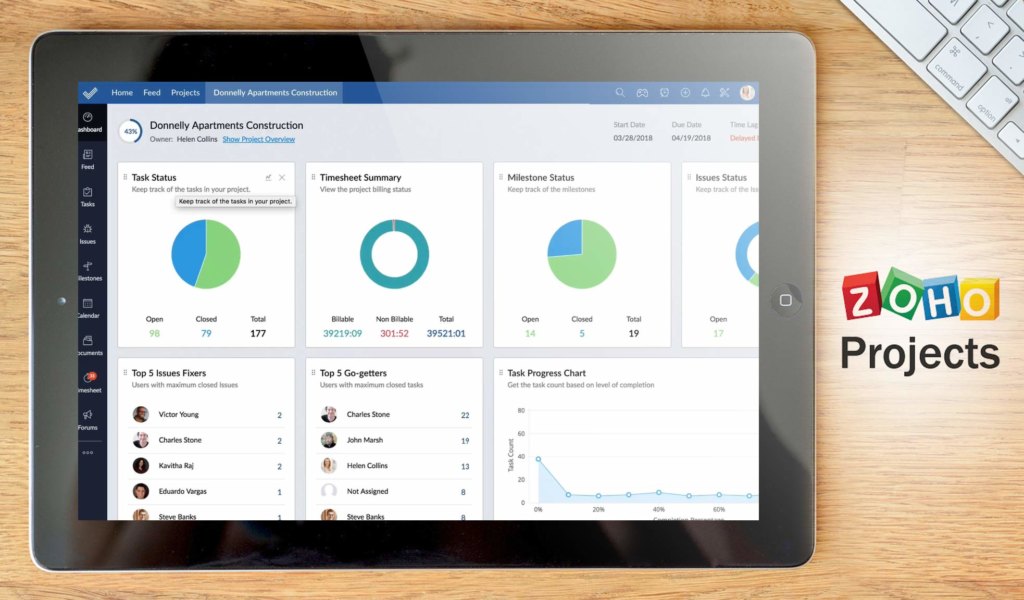
Zoho Projects has a freemium plan for one project and three users, good enough for startups that are just setting up operations. But the software can scale to enterprise-grade features, making it ideal for fast-growing businesses.
The software allows you to divide projects into milestones and organize tasks by dependency, which helps you track the overall progress with detailed accuracy. Among others, the app is suited for managing issues and bugs to ensure tickets are resolved by priority and at the right time by the right people.
Zoho Projects also fits agile projects, notably hybrids. You can integrate it with Zoho Sprints and sync and share data between apps. This setup suits you well if you’re handling multiple projects, where some projects are optimized for sprints, while the mother project follows a waterfall pipeline. You can shift from Gantt to Kanban or to the classic view.
Other important features include feeds, a built-in chat, mentions, automation, customizations and time management.
Paid plans start at $4 per user/month.
Detailed Zoho Projects Review
6. ProntoForms
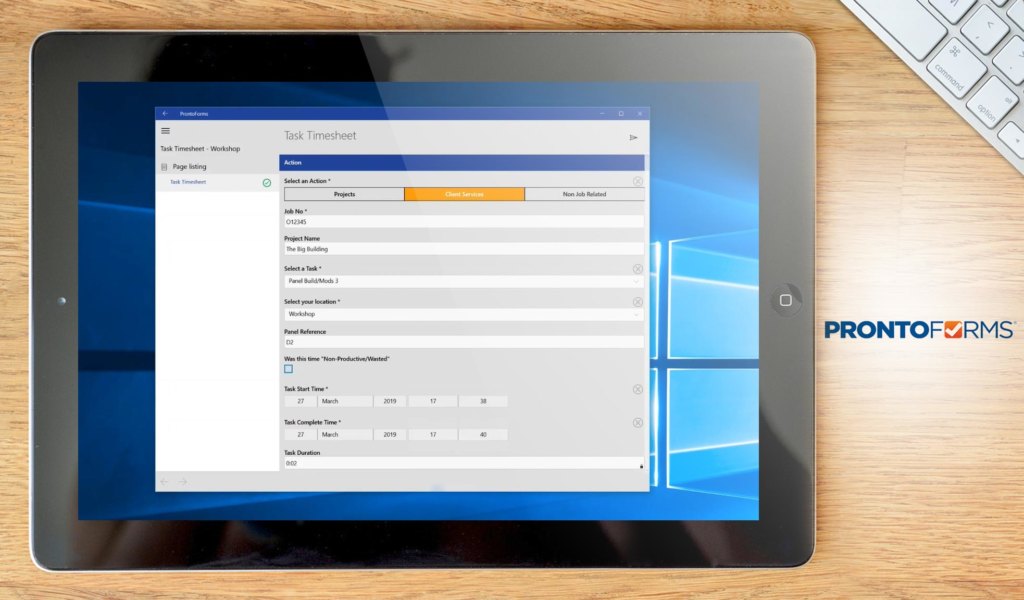
ProntoForms is a mobile forms app ideal for companies that are into field service. If you operate or plan to start a business in repair and installation, HVAC maintenance, plumbing, electrical and roofing services, among others, this app helps you to coordinate and consolidate data between the office and remote team. ProntoForms also suits a company’s site safety initiative, namely, in construction and facility management.
With customizable fields and dashboards, you can create mobile forms that match your workflow or field data requirements. The forms act as a frontline endpoint to gather or deliver data from or to the field and feed it into a CRM, ERP or FSM. Collected data can be used for business intelligence, lead generation and other strategic uses.
Use cases for its forms include deploying safety procedures, using it as a compliance checklist, providing context to work orders and as a data capture tool for field inspections, risk assessment or surveying.
Other key features include a workflow builder, reporting & analytics and robust integration with widely used software systems such as Salesforce, SERVICEMAX, Google Apps, INTELEX and Zendesk.
Plans stat at $15 per user/month.
Detailed TrueContext Review
7. elapseit

elapseit is a fully featured software covering the entire project management phases, from planning to closing. It suits startups dealing with more complex or multiple projects at once, helping them manage budgets, resources and tasks.
The software consists of modules for task management, budgeting and reporting. It also includes planning & forecasting features, invoicing, payroll and customizable dashboards.
Among others, elapseit helps you break down projects into tasks and subtasks, and keep them and relevant files and conversations in one place for easier monitoring or retrieval. You can also get a quick lookup for the project’s progress or drill down into details to address issues like bottlenecks and pending tasks.
The software also includes time tracking, document management, expense capture and timesheets. You can further tailor it along the lines of your workflows through its open API, or integrate it with Xero for accounting.
Plans start from $12.60 per user/month.
Detailed elapseit Review
8. Celoxis
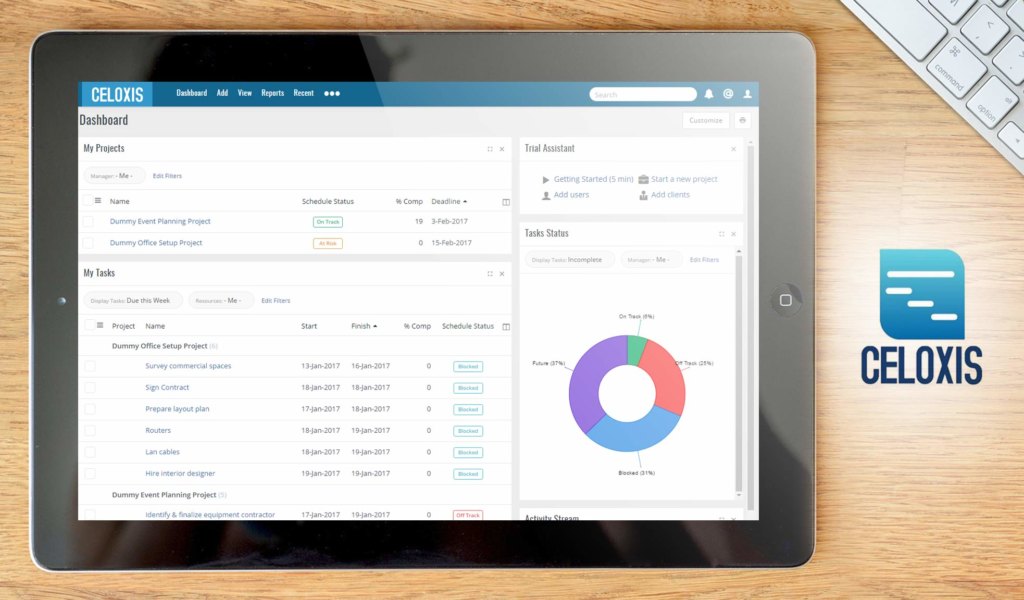
Celoxis leans towards enterprise project management software suited for project planning, budgeting, resource management and issue tracking. With plans starting at $22.50, it is more ideal for well-funded startups with complex project requirements than bootstrapped ones.
The software can adapt to different methodologies including agile. Besides availability, resources can be allocated by skills or priority. Likewise, you get to organize and track request tickets based on priority or by other metrics relevant to your workflow.
Celoxis also features dynamic project dashboards, UI and a collaboration workspace. It keeps project files and team conversations in one place. An external stakeholder like a client or supplier can even join in as a guest collaborator.
Other key features include Gantt/Kanban views, time tracking, advanced scheduling and a client portal.
The software integrates with key business apps from Salesforce, Google and Microsoft, among others.
Detailed Celoxis Review
9. Daylite for Mac

Daylite for Mac is CRM software designed for Mac users. It leverages the smooth native integration of Apple products, enabling you to manage project workflows supported by Siri, TouchID, Apple Calendar and other Apple apps from a Macbook, iPad or iPhone.
Rich in features in itself, the software adapts to a range of business models, be it financial services, real estate, software development and other client-based businesses. It is ideally suited to creative projects and sales & marketing pipelines.
A shared workspace allows teams to collaborate and communicate clearly. They can also share files and use the app as a central file repository for easy access to key documents.
You also get to monitor tasks from a single location and, overall, track a project’s progress. Likewise, you can automate workflows or set permission controls.
Daylite for Mac can also be used to onboard employees or clients to your project. You can personalize messages, attach notes and track conversation threads. Its other features include customizable dashboards and analytics that let you generate KPI reports.
Pricing starts at $39.99 per user/month.
Detailed Daylite for Mac Review
10. Fiix

Fiix is an AI-enabled software for managing preventive maintenance and asset management tasks. You can consolidate relevant workflows, resource requests, tasks, tools and schedules in one platform, the easier to track asset performance or keep up with maintenance routine.
The software consists of features for asset monitoring, work order management, inventory management and preventive maintenance, among others. It is ideal for managers in charge of operations, facilities and assets, helping them handle multiple job orders simultaneously.
You can customize a work request portal along the lines of your processes, allowing employees and even key partners (e.g, suppliers, vendors, inspectors, etc.) to receive and work on assigned tasks. You can upload work orders in CSV and tag them with mobile QR codes for reference.
Fiix integrates smoothly with other project management software, inventory software, ERP and accounting software.
A freemium is available for 25 PMS, while paid subscriptions start at $45 per user/month.
Detailed Fiix Review
11. Easy Projects
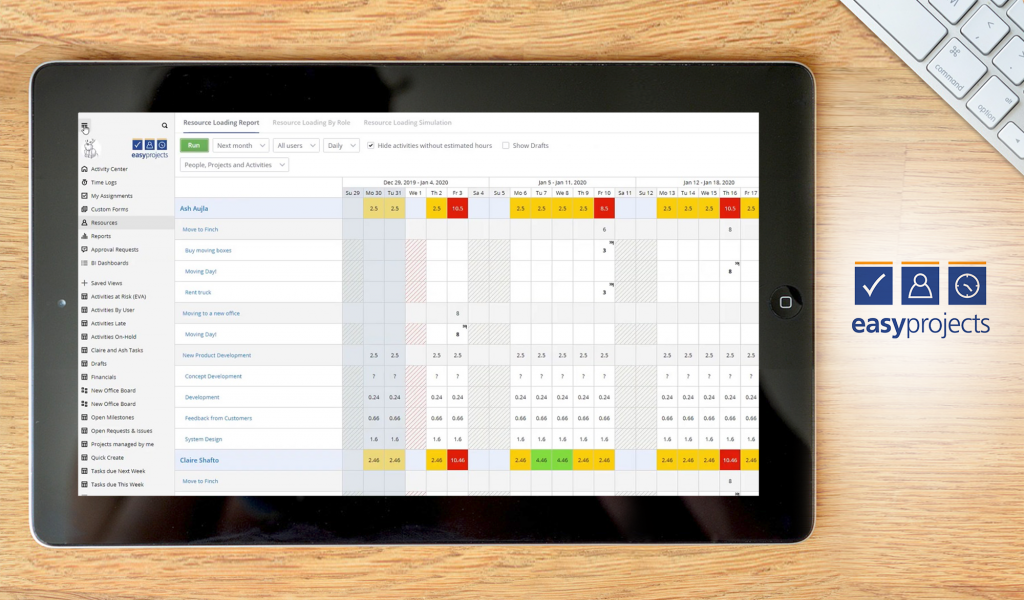
Easy Projects is able to handle both simple and complex projects, primarily helping you manage resource allocation, budgeting and tasks. Project leaders dealing with spreadsheets, emails and local files will find the software a practical replacement.
They will also find different ways to view projects for insights and quick lookups, such as through Kanban boards, Gantt charts, calendars and tables. Along with real-time reports that Easy Project can churn out, these visual tools allow you to track your KPIs, including the budget.
Likewise, the software allows you to organize task dependencies in an unlimited hierarchy. This unique feature makes it easy to link related tasks and subtasks, especially in projects involving large or several teams.
Easy Projects also feature customizable forms, a client portal, permission control, and templates. It integrates with key business applications such as Salesforce, HubSpot, JIRA, Microsoft Outlook and Create Cloud.
Pricing starts under $7 per user/month.
Detailed Easy Projects Review
12. Bridge24
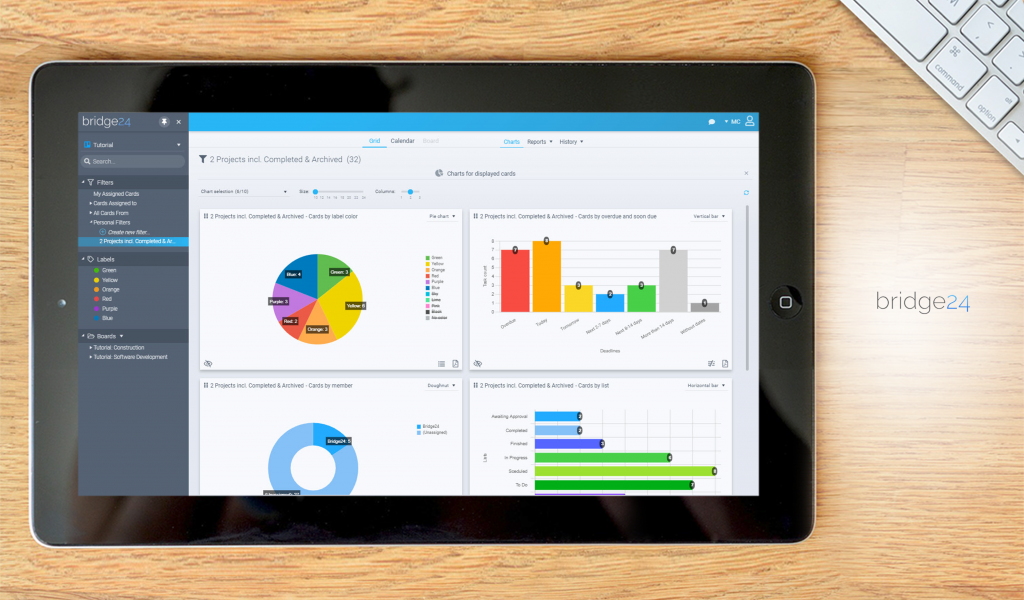
If you’re managing tasks in Asana, Basecamp or Trello, integrating Bridge24 into it helps you generate advanced reporting to manage your KPIs. Bridge24 syncs your data from any of the task management apps mentioned and consolidates the data for insights.
Small teams or businesses can use Bridge24 to level up their project management reporting with contextual and interactive charts.
Bridge24 also allows them to view reports in different ways based on their priority metrics. Using smart filtering, they get to narrow down a report to a specific metric like efficiency, financial or resources. For the big picture, tasks can be viewed as Kanban boards or Gantt charts.
Other key features include customizable fields, CSV exporting and task history.
Plans start from $25 per month inclusive of five users.
Detailed Bridge24 Review
13. Infolio

Infolio offers a freemium app, featuring lightweight CRM and project management tools. These include unlimited projects, unlimited users, unlimited boards and spaces and custom fields. Should you need more advanced features, Infolio can scale to the needs of more complex projects.
In most cases, you’ll find the software’s standard features able to help you manage tasks conveniently. Tools like file attachments, tags, task-subtask hierarchy and multiple assignees can help you consolidate your project in one place for easier monitoring. Lists can also be customized to adjust to your workflow.
The software allows you also to monitor a project either in timeline or team view, helping you to switch from monitoring schedules to task responsibilities. Infolio also features an in-app chat and a collaboration space for teams. Starting a project pipeline should also be easy with templates at your disposal.
Pricing starts at $4.99 per user/month.
Detailed Infolio Review
14. JobNimbus
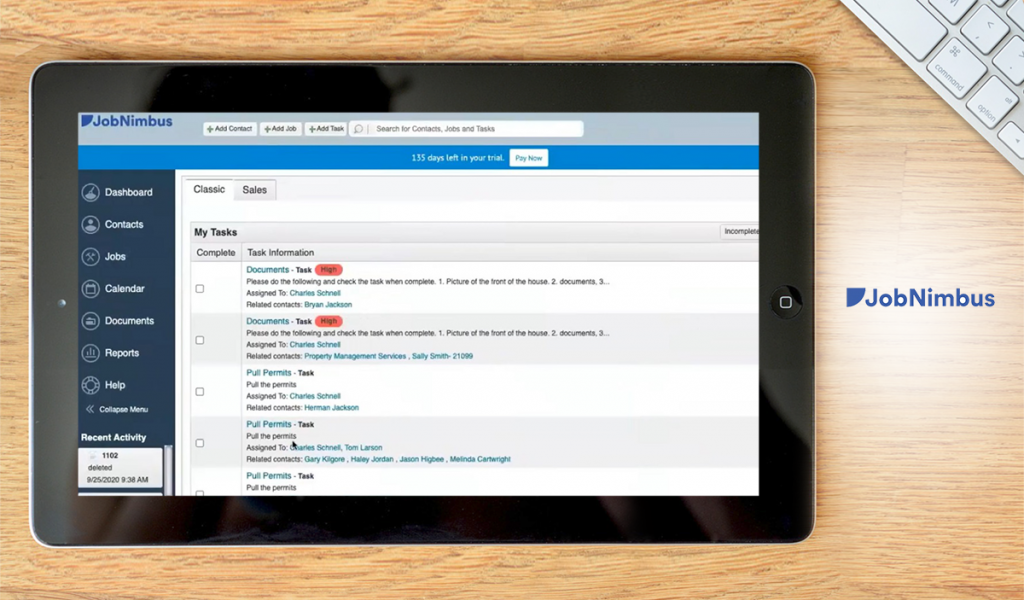
If you’re starting a field service business, JobNimbus is a good fit. It is a project management/CRM software perfect for roofing and exterior projects. It is ideal for restoration, remodeling, solar installation, painting, flooring, window and door installations, and similar projects. The features cover a field project’s entire workflow, from lead generation to billing.
It can be customized to match various processes, while a single location to place your customer, supplier and partner contacts and their emails and conversations help you gain context per contact.
Likewise, a sales pipeline lets you follow leads and focus on high-converting prospects or offer a repeat service down the road.
Other key features include tools for project estimation, document and image storage, alerts & notifications, task management, invoicing and payment. Custom reports and a neat dashboard are also available.
Pricing is by quote only.
Detailed JobNimbus Review
15. awork
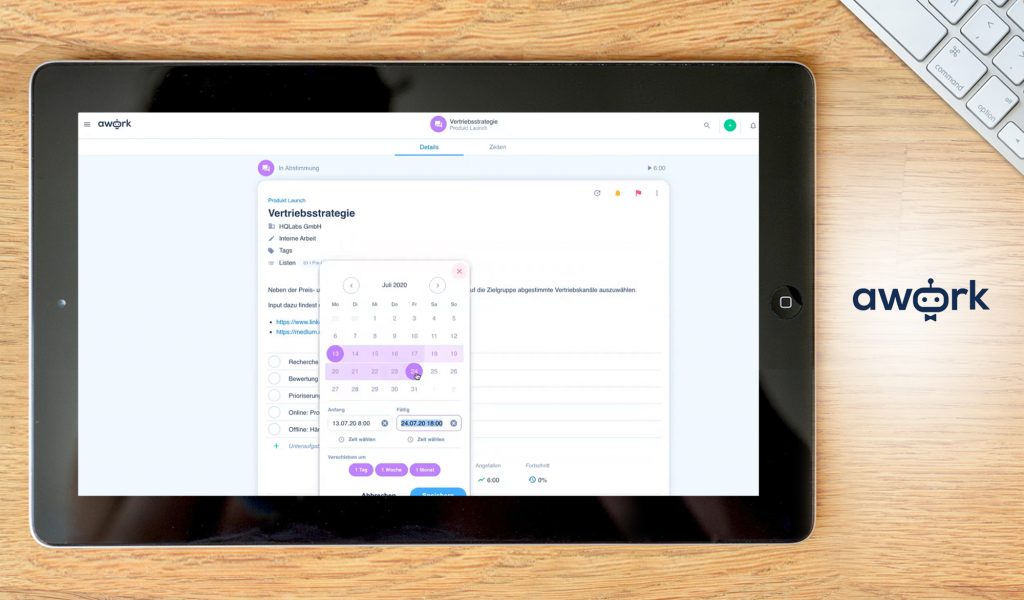
awork is a work management tool that helps you organize projects and collaborate with your team in a common digital workspace. It is designed for the general needs of projects of any size but is most suitable for startups and small to midsize companies.
It comes with project templates, team schedules, Gantt charts and Kanban boards. For managing tasks, you can utilize its to-do lists, recurring tasks, subtasks and reminders. Meanwhile, a time-tracker is built into the app to help you manage billing with transparency.
You can configure permissions, guest access, tagging and dashboards to manage teams at different collaboration levels.
Lastly, awork can adapt to any workflow with its open REST-API.
Plans start from around $11+ per user/month.
Detailed awork Review
Startups Need to Think of Scale
In most cases, project management software for startups should scale to more advanced tools to keep up with the company’s growing needs. Even as you fiddle with free or basic plans to manage costs, sooner or later, you will need more sophisticated features like project portfolio management and advanced reporting.
The good news is, all the software solutions above are versatile. You can check the top product, monday.com, and give it a firsthand look at how it can scale to your growing requirements.






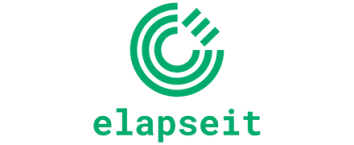


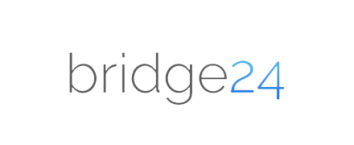

























Leave a comment!